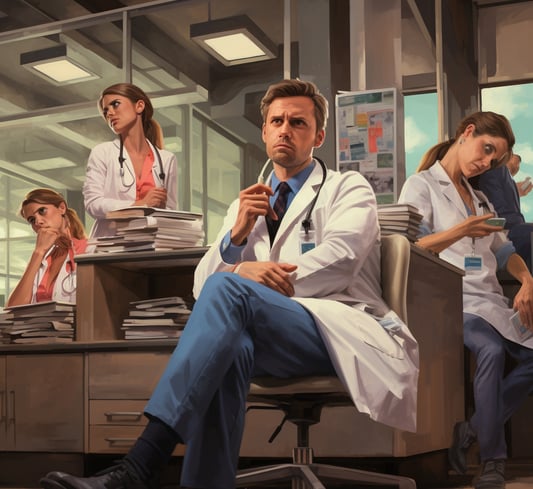Inspire Your Colleagues With Creative Meetings In The Workplace
Simple Steps Anyone Can Take Inject Some Creativity into Your Hospital Department
CREATIVITY
Chaim Haber
11/27/20234 min read
I have been working as a doctor in the medical system for many years now, and as much as I enjoy working with my colleagues, I often find myself frustrated by the lack of creativity exhibited in the workplace; It turns out that just because you're smart, it doesn't mean that you think outside the box.
But Creativity Is Only For The Creative
Many people (my workmates included) believe that you are either the "creative type" or you aren't. After reading and thoroughly enjoying "It's all about creativity" by Gavin Suss, my perception completely shifted. I now realise that just like any skill, creativity can be learned and improved with technique and intentional practice.
So why bother? Creativity is the fuel that fires innovation. Problems that may seem unsolvable, or big-picture decisions can look completely different when one has a creative outlook. I believe that once you unlock this world of possibility and ingenuity, it increases your confidence in your ability to cope with challenging situations - I find this closely linked to the 'growth mindset' where you may even relish challenges and difficulties as opportunities for self-improvement.
But still - easier said than done. It can seem like an untenable feat or even potential for embarrassment to try something new, especially in a place where people may already have a particular opinion of you. However, in my experience, as soon as you set the right environment and make clear the your intentions, you'll be amazed and surprised at the outcome. People have a need to be heard and respected, and once you realise and believe that everyone has creativity inside them, you will see amazing results.
So now you're convinced of the why, here is the how:
Set a Time and Place
It all in the marketing.
If I were to ask my coworkers if they want to sit down and think creatively with me, I don't want to tell you the sort of response I would get. It would likely include them not having time and them "not being into that sort of thing". This can be remedied by advanced planning and the correct 'framing'.
Set a date in the calendar in the not-too-distant future and invite the relevant people to for a brainstorming session for departmental improvement. Make sure you meet in a quiet and comfortable environment and that no-one is in a rush, I recommend designating 60-90 minutes.
5 Tips to Get the Best Out of Your Meeting
Set The Atmosphere: Establish a positive and inclusive environment. Start by telling them that they were selected for this meeting because of their talent and creativity - your belief in them will translate into belief in themselves.
Use An Ice Breaker: This will help everyone feel at ease and even get to know each other a little before getting started. A simple question or game can work wonders. See below for some of my favourite questions.
There Are No "Bad Ideas": Explain that brainstorming is a trial and error process, and that it only works when people feel at ease to express themselves. I like the famous quote by Thomas Edison how his inventions were down to "1 percent inspiration and 99 percent perspiration." In the Stanford Biodesign Course for medical startups, instead of rejecting someones suggestion, you are encouraged to build on others' ideas by saying "Yes, AND...".
Get Moving: Encourage people to get up and move around - play catch, write on a white board, or just walk around... movement can really help get you into the flow of things
Go For Quantity: In order to get more people involved and increase the chances of hitting some good ideas, encourage as many ideas as possible - try for one per minute
Prompts to Spark Creativity
Once you've created a comfortable environment and people are ready to roll, it's time to get to meat of the meeting. To give a structure for the session, prepare some broad questions that will keep you grounded and move you forward if you hit a dead end. A few examples related to work in a hospital are:
Which of our processes are inefficient? How can they be streamlined? It can be useful to break down each element of the pathway into blocks, and then ideate over whether it can be done better.
How can we improve patient experience? Think of all the points of contact between a patient and medical system and think how it could be made more pleasant.
How can we create a more welcoming environment? Analyse the patient journey and what greets them at every stage - Could this be improved?
How can we promote staff well-being? Identify the elements of the job that are least liked and try to improve on them.
Conclusion
At the end of the meeting, agree on the "next steps" to take forward for your solutions, and the person responsible for each step. This solidifies your progress, and now you will know with whom to follow up.
Creating change is always challenging. Take into account that introducing this to your department won't feel natural to you at first, especially if they didn't know this side of you. But you only know when you try. Everyone has an opinions and ideas, but often they just haven't been asked in the right way. Using these methods, you will empower your coworkers to think big. An added bonus is that because they were part of the process, any solution you come up with will have the full support of the group, as opposed to the top-down pattern we often see in large organisations which may lead to reluctance.
On a final note, I find that once you develop a habit of creativity, you will see a direct effect that it encourages and fosters proactivity. Proactivity is one of my favourite characteristics in a person and frankly, will make you a pleasure to work with. There is a world of difference between complaining about something to your seniors, versus explaining the problem to them with a proposed solution. You just have be a bit creative.




Bonus - My Favourite Ice-Breakers
If you woke up tomorrow as an animal, which animal would it be and why?
Little-known fact about yourself
If I wasn't a doctor (choose profession) what would I be?
If you had to give a 20 minute TED talk on something that is unrelated to your job, what would it be? (My Personal Favourite)
